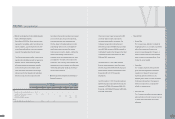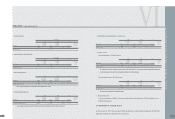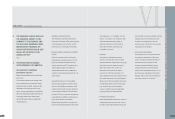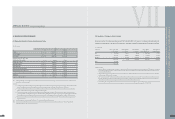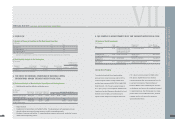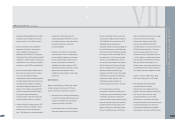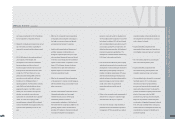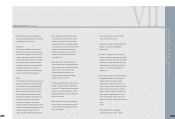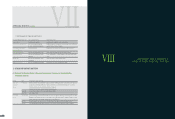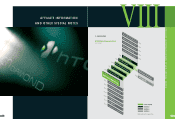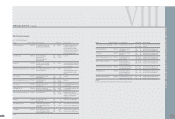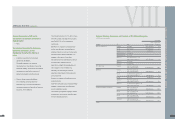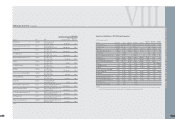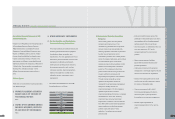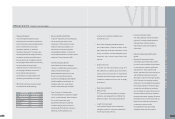HTC 2007 Annual Report Download - page 110
Download and view the complete annual report
Please find page 110 of the 2007 HTC annual report below. You can navigate through the pages in the report by either clicking on the pages listed below, or by using the keyword search tool below to find specific information within the annual report.
215214
A REVIEW AND ANALYSIS OFTHE COMPANY'S FINANCIAL CONDITION
AND OPERATING RESULTS,AND A LISTING OFRISKS
internal funding rather than long-term loans,
so interest rate volatility has had no effect on
HTC's liabilities. On the assets front, HTC's
capital planning is conservative and
emphasizes stability. Security and liquidity are
the chief considerations in capital allocations,
which are primarily in NT Dollar-denominated
term deposits. In 2007 the average return on
term deposits was 1.92 percent, generating
interest income of NT$800 million. As HTC
has only very small proportion of its capital in
other financial assets, the impact of interest
rate risk is negligible.The company's policy
regarding high-risk investments, highly
leveraged investments, loans to other parties,
endorsements, guarantees, and derivatives
transactions; the main reasons for the
profits/losses generated thereby; and
response measures to be taken in the future. :
• HTC operating revenue is primarily
denominated in US dollars and Euros, with
manufacturing costs also mostly denominated
in US dollars. International exchange rate
volatility is therefore likely to impact operating
revenues, operating costs and net operating
profit denominated in foreign currency. HTC
avoids exchange rate risk primarily through
the use of forward exchange contracts, buy
also by strengthening controls over the quality
and turnover of accounts receivable
denominated in foreign currency. At the
beginning of fiscal 2007 the Euro/NTD
exchange rate was 1:43, but by year's end the
NT Dollar had appreciated by 11.16 percent
and the exchange rate stood at 1:47; the
USD/NTD exchange rate fluctuated between
1:32-33, resulting in overall foreign exchange
gains and losses of NT$560 million for fiscal
2007. For the most recent fiscal year, the
negative impacts of exchange rate fluctuations
on profitability have been minimized thanks to
the company's effective management controls.
• Taiwan's 1.6 percent inflation rate in fiscal
2007 had very little impact on HTC profits.
> Risks Associated with High-risk/High-
leveraged Investment; Lending,
Endorsements, and Guarantees for Other
Parties; and Financial Derivative Transactions :
• HTC does not make in high-risk, highly
leveraged investments, loans to others,
endorsements, or guarantees. All financial
derivatives transactions are conducted to avoid
exchange-rate fluctuation risks for foreign-
currency denominated assets and liabilities,
and conducted in accordance with the policies
VII
requirement planning (MRP) system, thereby
reducing inventory management costs and
losses on decline in value of idle inventory.
> Enhance work efficiency to maximize the
productivity of each link in the production
chain, strengthen time management,
standardize work processes, and implement
Total Quality Control (TQC) policy through ISO
certification to help HTC reduce operating and
communications costs, and reach TQC goals
to effectively improve HTC's competitiveness.
> HTC still depends largely on foreign sources
for key parts and components, but because
HTC is one of the industry's leading
manufacturers and its technological expertise
is widely recognized, providers of those parts
and components are happy to cooperate in
expanding the application markets for HTC
products. HTC maintains close relationships
with its strategic alliance partners that allow
the company to garner the support of
overseas suppliers, effectively reducing raw
material purchase costs for HTC products.
> In order to diversify its supply channels, HTC
is actively seeking more suppliers to ensure
reliable sources of supply at competitive
prices. The fact that some domestic suppliers
are planning to produce key parts and
components greatly benefits HTC in terms of
its purchasing choices, reducing the required
purchasing lead time and increasing
purchasing flexibility.
> The electronics industry is now the fastest
growing industry in Taiwan, and high growth
requires significant investment in manpower,
but recruiting basic labor has become more
difficult in recent years as the number of
available personnel has decreased. HTC is
addressing this issue by continuing to import
appropriate foreign manpower and by
establishing industry-education relationships
with schools.
(2) R
i
s
k
M
a
tt
e
rs
Based on the analysis of the positive and negative
market and industry factors above, HTC's risk
matters and response measures are as follows:
> The effect upon the company's profits (losses)
of interest and exchange rate fluctuations and
changes in the inflation rate, and response
measures to be taken in the future. :
• For the past few years, the operating capital
required for expansion has been provided by
SPECIAL N OTESI RISK EVENTS
l


